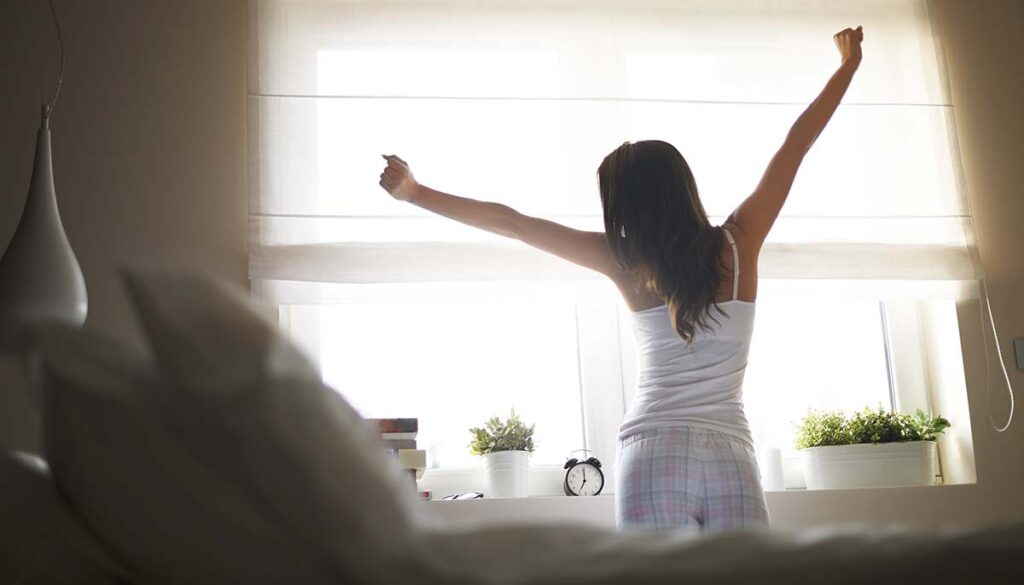Not sleeping at all is never ideal. Sleep deprivation is bad for our overall health. But sometimes, staying up all night becomes inevitable. Whether you’re cramming for an exam, working to meet a deadline, or afraid you’ll miss that 4 am flight, pulling an all-nighter can greatly affect your sleep schedule. And no matter why you’re up from dusk until dawn, getting back on track is crucial.
So if you’re pulling an all-nighter or looking to recover from one, here are some pro-tips to get through it, get back on track, and take care of yourself in the process.
Negative Effects of an All-Nighter

Staying up all night practically guarantees fatigue. If it becomes a regular habit, it can also lead to chronic sleep deprivation. The following day, you’ll inevitably be less alert, your cognitive functioning will be diminished, and your immune system will be depleted.
The most common signs and symptoms of sleep deprivation include daytime drowsiness, mood swings, episodes of microsleep, confusion, memory issues, and health problems ranging from minor to serious, upping the risk of hypertension, diabetes, and heart disease.
With that said, if you find yourself in a situation where you must stay up all night, don’t panic. There are ways to get through it and come out the other side A-okay, but more on that in a minute.
Read More: Common Mistakes That Destroy a Good Night’s Sleep
Is it Ever Okay to Stay Up All Night?

It goes without saying, it’s better to avoid an all-nighter if a good night’s sleep is an option. No matter why you feel it’s necessary, it’s never in your best interest to get less rest than you need. Not to mention, various studies show that those who stay up in an attempt to absorb information or study are often unable to actually retain that information and significantly more likely to make and overlook mistakes.
To do your best, you need your rest. Also, it can be dangerous to function on little rest. Driving a car, making important decisions, or operating heavy machinery are all ill-advised activities. When you’re sleep-deprived, think of yourself as being “under the weather” and don’t do anything you wouldn’t do while sick.
If you have to pull an all-nighter, going easy on yourself the next day is essential. And so is avoiding any activity that requires quick reaction time and sound logic. The less we sleep, the more likely we will are to become delirious without realizing it.
How to Pull an All-Nighter (When You Have to)
You shouldn’t make a habit of pulling all-nighters. But if you find yourself burning the midnight oil, come to the sleep-deprived party prepared. I’m sure it goes without saying: take advantage of caffeine with increased alertness in mind. Obviously, you’re going to need it. But consume caffeine responsibly. Studies show that caffeine intake every few hours can help reduce thinking problems caused by sleep deprivation.
Those same studies show it’s better to space out your coffee refills rather than consume cups of joe in rapid succession. Also, drinking plenty of water is critical. So between your rounds of caffeine, make sure you’re staying hydrated and not becoming dehydrated.

When it’s dark outside, your body clock is going to send signals saying it’s time for bed. To avoid drowsiness, keep the lights on. A well-lit space will help you dodge drowsiness and remain focused rather than relaxed. With that in mind, find ways to stay motivated and alert.
Your instincts will be pulling you towards rest, so it won’t hurt to remind yourself why you’re doing this and do eye-opening exercises in the process. If you feel yourself drifting, get up and move around, chew gum, or invest in aromatherapy oils that promote alertness and memory.
No matter how tempting it might be to binge eat junk food or candy while you’re tired, resist the urge. Unhealthy or heavy foods are bound to make you sleepier. So reach for a healthy snack or a balanced meal, especially leading up to your all-nighter.
Always, always double-check your work, especially when sleep-deprived. If you feel you just can’t do it, social support can help you get through it. Reach out to those who help you feel motivated and/or keep late-night hours regularly. And no matter the time of day or night you’re exerting mental energy, you should always take brain breaks with your health (and productivity levels) in mind.
How to Recover After an All-Nighter

When pulling an all-nighter, allowing your body to recover is always the most important part. Here are some sleep expert-approved tips to heal and return to your usual bedtime routine:
- Stay active. As soon as humanly possible, it’s critical to return to your regular sleep schedule. So while it might sound strange, you need to stay awake the next day. The best way to do this is to keep your body moving as much as possible. So do stay on your feet, but don’t push yourself too much.
- Go easy on your digestive system. You want to avoid a full system crash. And so, you need to avoid eating a alrge meal immediately after your all-nighter. As the day goes on, keep your meals light. Reach for snacks high in protein or complex carbs, like nuts, dried fruit, fresh fruit, yogurt, spinach, broccoli, or sweet potatoes.
- Cut your caffeine intake. Let’s face it, if you’ve just pulled an all-nighter, you’ve probably had your fair share of caffeine. With a good night’s sleep in mind, it’s time to cut back. And with your body running on empty, too much caffeine can lead to adverse reactions, like anxiety, interrupted future sleep, and dehydration.
- Squeeze in a power nap, but avoid sleeping too long. If needed (and possible), find time to take a short nap or two before nightfall. With that said, avoid the urge to snooze for hours in the middle of the day. Sleep deprived or not, a long nap can derail a solid night’s sleep.
All of these tips can help you stay awake in the event you must pull an all-nighter. But they should only be used when you absolutely have to. And again, what’s most important is that you prioritize getting proper rest sooner rather than later.
Read More: Ways to Get Over That Afternoon Slump
Get Solid Rest (As Soon As Possible)
You’re strong enough to get through this. There’s no doubt about it. But you shouldn’t make a habit of all-nighters, even if you’ve practically gotten them down to a sleepless science.
Solid rest will always benefit you more, but again, that doesn’t mean sleeping all afternoon. For truly sound rest, consistency is key. Following an all-nighter, re-establishing a healthy schedule should become priority number one. So once you’ve made it through and another day has begun, your focus needs to be on taking any and all necessary steps to recover.
Throughout the day, safety should come first. While you’re running on little to no sleep, always avoid putting yourself or others at risk. Remember, you’re not as sharp as well-rested you would be, so proceed with caution and be extra careful. And then, set your sights on recovery sleep.

Following an all-nighter, recovery sleep is of the utmost importance. Aim for somewhere between seven to nine hours and close the kitchen earlier than usual. The last thing you want to do is extend your sleep deprivation. Otherwise, all of those all-nighter-related negative side effects will likely go from bad to worse. The longer you’re awake, the more likely you are to face problems caused by sleeplessness. So work on getting back on track sooner rather than later.
Once you’ve made it through your all-nighter and fully recovered, it’s in your best interest to find ways where you won’t need to go through the same situation moving forward. Ask yourself how you can prevent similar situations that involve staying up all night. Making a habit of all-nighters might seem like a good idea, but it’s never in your best interest. When you think of all-nighters moving forward, think of them only as a last resort and do what it takes to avoid them.
Plan Ahead
Look at your schedule as it stands and think of what you have on the horizon. Is there a major project looming? Do you have an exam coming up? Don’t wait until the last minute to start working on those things. Get ahead of them and stop losing much-needed shut-eye. And if you’re not exercising regularly, now is the time to start. Daily exercise promotes healthy sleep better than almost anything else we can do.
Decide what do you need to get started and don’t delay. Sleep deprivation is a vicious cycle. Once you’re too tired to fully function, exacerbating your restless condition won’t do you any favors. After all, the work that comes from a sleep-deprived state will never compare to what you can accomplish fully rested.
The more time you allow yourself to get things done, the more opportunities you’ll have to improve whatever it is you’re working on. To give yourself the time and adequate zzz’s you deserve (and need), plan ahead and steer clear of all-nighters more often than not.
Read More: Proven Tips For Sleeping Better at Night













